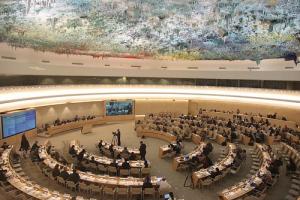 APC’s Joy Liddicoat explains the significance of Sweden’s proposal to the Human Rights Council to establish an expert panel on the internet and human rights.
APC’s Joy Liddicoat explains the significance of Sweden’s proposal to the Human Rights Council to establish an expert panel on the internet and human rights.
What has APC been doing at the United Nations Human Rights Council?
APC has been developing its work in the Human Rights Council, which is the primary body in the United Nations that considers human rights issues and monitors human rights situations around the world. APC’s strategy is to bring forward internet rights and human rights to the HRC. In June this year we suggested to the HRC that an expert panel might be one way to take forward the issues in the annual report of the Special Rapporteur on Freedom of Opinion and Expression, which focused on the internet.
What is an HRC Expert Panel?
A group of people chosen to consider a particular subject and advise the Human Rights Council. The HRC has these for all sorts of issues from country specific investigations (e.g about Syria or Sri Lanka) to topical issues like freedom of peaceful assembly, which is the focus of the 18th session.
Why have a Panel?
A Panel is often seen as the softest, most risk-free step that the Council can take on an issue. Sometimes these kinds of panels are criticized because of that – being too weak an option, not really doing anything, a delaying tactic etc. On the other hand it is a good entry point for a new issue and it’s safe in the sense that there is no automatic follow up.
However, it’s still useful for bringing a new agenda forward or consolidating an issue without negotiating a resolution, and without risking creating divisions around a bad resolution. For this reason I think it is a really good option for the internet rights are human rights work. If it goes badly, the outcome won’t be strategically damaging and it will give us a chance to see how states will engage.
How does the Panel work?
There is no set procedure for Panels. Generally, it is up to the leading sponsor State to coordinate the identification of panelists and the general concept note of the meeting. A panel consists of a 3 hour formal UN debate – usually introduced by 4-5 experts in the field and high level personalities. States and some NGOs respond to that with their political statements. At the end the Panel reports to the Council, hopefully with some recommended actions. If the idea of a panel is accepted, this might happen at HRC 19 in March 2012.
Are there any risks?
Yes! The panel outcomes may be weak if the “experts” are not of high quality or there is weak or ill-informed engagement on the issues, or if the sponsoring State does not co-ordinate the process well. Because there is no process for a resolution to be voted on at the end of the panel, there is a risk that discussion will remain very diplomatic, that it may water down the substance of the issues, and that it still gives the possibility for opponents to disrupt debate or ensure there are no concrete outcomes.
APC believes that, to be effective, the proposed panel must operate through open processes, which ensure the engagement of all, particularly vulnerable and marginalised groups, in accordance with the rights-based approach and principles of multi-stakeholder engagement, information sharing, participation and transparency.
What will APC try to do?
First up, we will rally support for the Panel by making joint statements and writing to governments and encouraging other NGOs to support as well.
If the HRC votes to go ahead with a panel, we will suggest areas of focus in the terms of reference, suggest experts, share our research and mobilise engagement as part of the Connect Your Rights! Campaign. If all goes well, we would look to follow up the Panel’s recommendations in the UPR processes that APC is supporting in India, Brazil, South Africa and the Philippines which will go before the HRC in June 2012.
When will we know and what can we do?
The resolution is likely to be voted on in the second week of HRC 18 (which goes from Sept 12-30). We should definitely know by the time of the IGF in Nairobi – that will be another place to do some strategising and lobbying.
This panel, should it go forward, is a unique opportunity for us to gauge the state of affairs surrounding internet rights. Even without a resolution, we will be able to identify sticking points and areas of consensus in the debate.